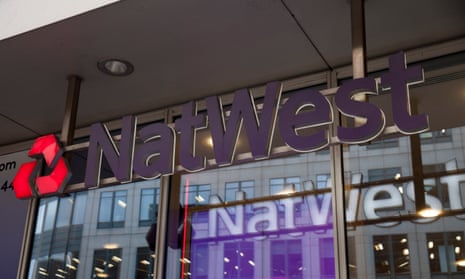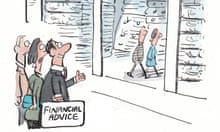A major high street bank has paved the way for the introduction of negative interest rates for the first time in Britain by warning customers it may have to charge them to accept deposits.
The warning by NatWest was made in a letter changing the terms and conditions for the bank’s 850,000 business customers, which range from self-employed traders, charities and clubs to big corporations.
It could mean that an account holder with £1,000 in a NatWest account could see that shrink to £999 or less the following year as the bank charges a negative rate of interest.
In its letter to customers, NatWest said: “Global interest rates remain at very low levels and in some markets are currently negative. Dependent on future market conditions, this could result in us charging interest on credit balances.”
The taxpayer-owned bank – whose parent is Royal Bank of Scotland – said it had no plans to make changes to the terms and conditions of personal account holders to allow it to charge negative rates.
Interest rates on government and corporate bonds fell steeply in the political turmoil that followed the Brexit vote. The Bank of England is now under intense pressure to cut its already historically low base rate from 0.5% to kickstart the economy, although a move into negative territory is not likely in the short term.
NatWest business customers are asking if negative interest rates are legal. They are asking whether they should take their cash out of the accounts and put it under the mattress to maintain its value.
One treasurer of a local community council, who received a letter but asked not to be named, said: “Can they do that, is it legal? The letter goes on to say that they ‘value our relationship with you’, but I may need to review how much I can afford to have a relationship with them!”
Another customer, who holds funds for her grandchildren in a business bank account, said: “Will this spread to all high street banks? I can’t access it myself to put it under the mattress.”
Other high street banks contacted by the Guardian said they had no plans, for now, to change contracts to allow them to impose negative rates.
The prospect of banks levying a charge on deposits rather than paying interest turns traditional banking upside down.
“It is going to make businesses much less keen to hold significant balances in their accounts,” said mortgage and savings expert Ray Boulger. “If NatWest start doing this, other banks are likely to follow. Eventually personal customers with large balances could be hit, but the banks may decide that is going too far and take the hit themselves.”
Negative interest rates could have widespread undesirable effects across the economy. Not only may customers decide to hoard cash rather than deposit it, banks may take excessive risks in lending in order to obtain returns, while pension companies will struggle to meet their liabilities.
So-called “voodoo banking” is already happening in some countries gripped by deflation.
The European Central Bank charges other banks 0.4% to deposit cash, while the Swiss National Bank charges domestic banks up to 0.75%.
Last week, ABN Amro, a major Dutch bank, told customers that because of “exceptional market conditions”, it may be necessary to charge negative interest rates at some time in the future.
After the Brexit vote, interest rates on government bonds – otherwise known as the “yield” – dived to record lows. When rates drop below zero, it effectively means people are paying the government to lend money to them.
The Bank of England this month chose to hold base rate at 0.5%, but in the City it is widely anticipated that governor Mark Carney will cut the rate to 0.25% on 4 August, as well as introduce other measures to boost the economy.
The prospect of negative interest rates has been mooted by individual policymakers but they are not seen as likely for the UK any time soon.
In April, Jan Vlieghe, a member of the Bank’s nine-member monetary policy committee (MPC), floated the possibility of interest rates being cut below zero, meaning companies would pay to deposit their money with banks. His fellow MPC member, the Bank’s chief economist, Andy Haldane, also raised the prospect of cutting official borrowing costs to zero or perhaps even lower in a speech last September.
But governor Mark Carney has appeared to oppose negative interest rates. Questioned by MPs in April, Carney said: “We think we could move base rate closer to zero but have not said we have an appetite for negative interest rates.”
Millions of customers with savings accounts in Britain are already suffering from historically low returns, with many accounts paying close to zero. The Financial Conduct Authority last week named HSBC, First Direct and the Post Office as having easy access accounts that in some circumstances pay no interest.
The introduction of negative interest rates on deposits could spark a legal challenge from customers.
Shortly before the credit crunch, Cheltenham & Gloucester building society launched a mortgage deal that tracked the main Bank of England lending rate minus 1.01%. When the Bank cut interest rates to 0.5% in 2009, that suggested borrowers would have to pay -0.51%. Instead, C&G cut the rate to 0.01% – its computers could not handle mortgages at 0% – but did not actually go negative. Any challenge to negative interest on deposit accounts may cite the example of C&G.
But there will be winners if interest rates move to zero or below. Since the Brexit vote, a number of lenders have cut interest rates on mortgage deals, with the biggest change to five- and 10-year fixed-rate deals, now on offer at little more than 2% interest.






Comments (…)
Sign in or create your Guardian account to join the discussion